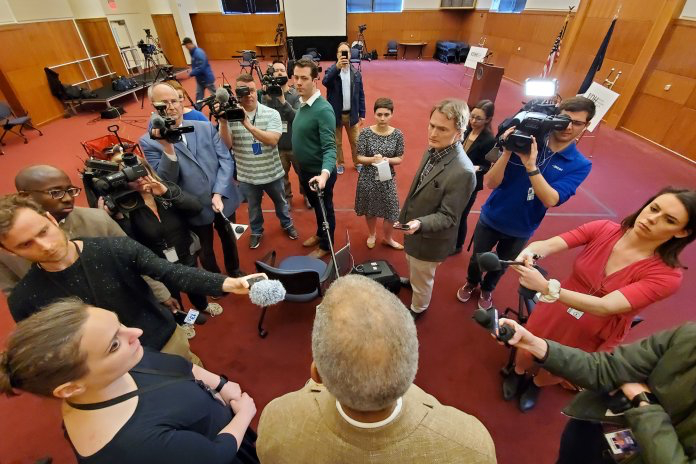Virginia Health Commissioner Dr. Norm Oliver speaks to reporters on Tuesday following a daily update on the state’s response to the spread of COVID-19. (Ned Oliver/Virginia Mercury)
By Kate Masters
VM – At a news conference this week, Virginia Health Secretary Dr. Daniel Carey provided the firmest estimates to date on the state’s capacity to respond to a surge of coronavirus cases.
Virginia has nearly 2,000 licensed ICU beds, each with access to ventilators and other respiratory support equipment, he said. Those supplies are often needed for patients with severe symptoms of COVID-19, the disease caused by a new strain of coronavirus, which can attack the lungs and limit the ability to breathe.
Six regional health care coalitions that operate under the Virginia Healthcare Emergency Management Program (VHEMP) have roughly 400 ventilator units that can be deployed to hospitals across the state, according to Carey. He said the state could also pull ventilators from the national emergency stockpile, estimated at 12,700, though President Donald Trump told governors in a Monday morning conference call that they should try to find their own sources of emergency medical equipment.
What still isn’t clear is how many of those beds and ventilators are currently open to patients. Carey told reporters that the state was “working with the regional coalition” to determine how many beds are currently unfilled and where they’re located.
“That planning is ongoing,” he said. “And we’re working to build on our pandemic flu plan that we’ve had in Virginia for several years. That’s the foundation and we are monitoring that through communications with our health care system on a day-by-day basis.”
Those numbers are becoming increasingly pivotal as coronavirus cases continue to rise. Virginia Health Commissioner Dr. Norman Oliver said the state had 77 positive results as of Tuesday, with 65 tests pending at the state lab in Richmond. Other samples had been sent to LabCorp and Quest, two private diagnostic companies with their own testing capabilities, making it all but certain that the total number of cases will increase.
Experts also say the number of diagnosed cases, given the strict restrictions on who can be tested and the fact that symptoms can be mild or nonexistent, are likely far lower than the number of actual infections.
“You can expect to see more,” Oliver said at the briefing. In James City County, one of the areas hit hardest by the disease, the state has identified at least 315 contacts of infected patients. There are currently three identified outbreaks of the disease, which the state defines as two or more cases that can be traced to a common exposure.
One is in James City County. The other two are in the Richmond metropolitan area, which currently has five known cases in Chesterfield County, two in Henrico, and three in Richmond City.
In Washington state, one of the areas hit hardest by the COVID-19 epidemic, doctors are rationing surgical masks and other emergency equipment. In Italy and China, which have also responded to thousands of cases, medical providers have been forced to ration ventilator access, prioritizing young patients and others with the highest chance of survival.
At a briefing yesterday, Carey said the state task force is working to expand bed capacity in partnership with hospitals, which don’t always fill their total bed capacity. Julian Walker, vice president of communications for the Virginia Hospital and Healthcare Association, wrote in an email that there are more than 18,500 licensed hospital beds in the state. Only ICU beds have regular access to respiratory equipment, but Carey said hospitals could convert unused operating rooms into bed space or request waivers to operate unlicensed beds — a way to quickly increase capacity in emergency situations.
The Medical Society of Virginia is also looking at ways to increase manpower and mobilize doctors if the state experiences an influx of new patients. Ordinarily, physicians are licensed to practice at certain facilities, and require state credentialing to work in other areas, said MSV President Dr. Clifford Deal. But the state could streamline that process, allowing more doctors to fill in at short-staffed hospitals.
As more private practices close down to limit potential coronavirus exposure and comply with the state’s new 10-person limit in confined spaces, it’s likely that more providers will be available for emergency response, Deal added. MSV is also working to facilitate communication between different medical groups to meet any new surge in COVID-19 hospitalizations.
“Our role is really manpower,” he said in an interview on Tuesday. “In the event that the health care system needs additional resources beyond what’s there, MSV can really help with that.”
Even as doctors look to mobilize, the state has provided few details on its current stockpile of personal protective equipment, including respirator masks. Oliver said the state had placed an order for $2.7 million in masks alone and received a “portion” of the shipment. The Virginia Department of Health did not provide additional information on the total number received by the state or when the order was placed.



